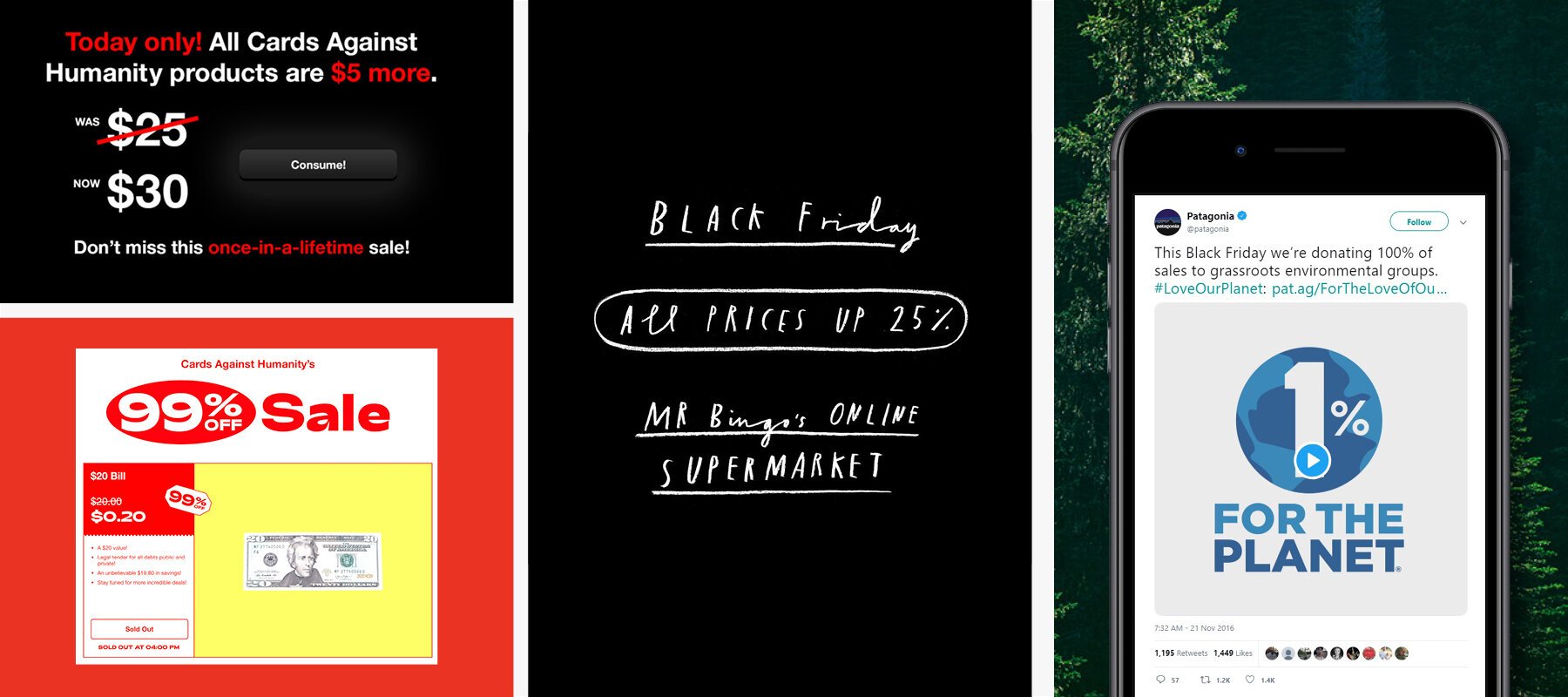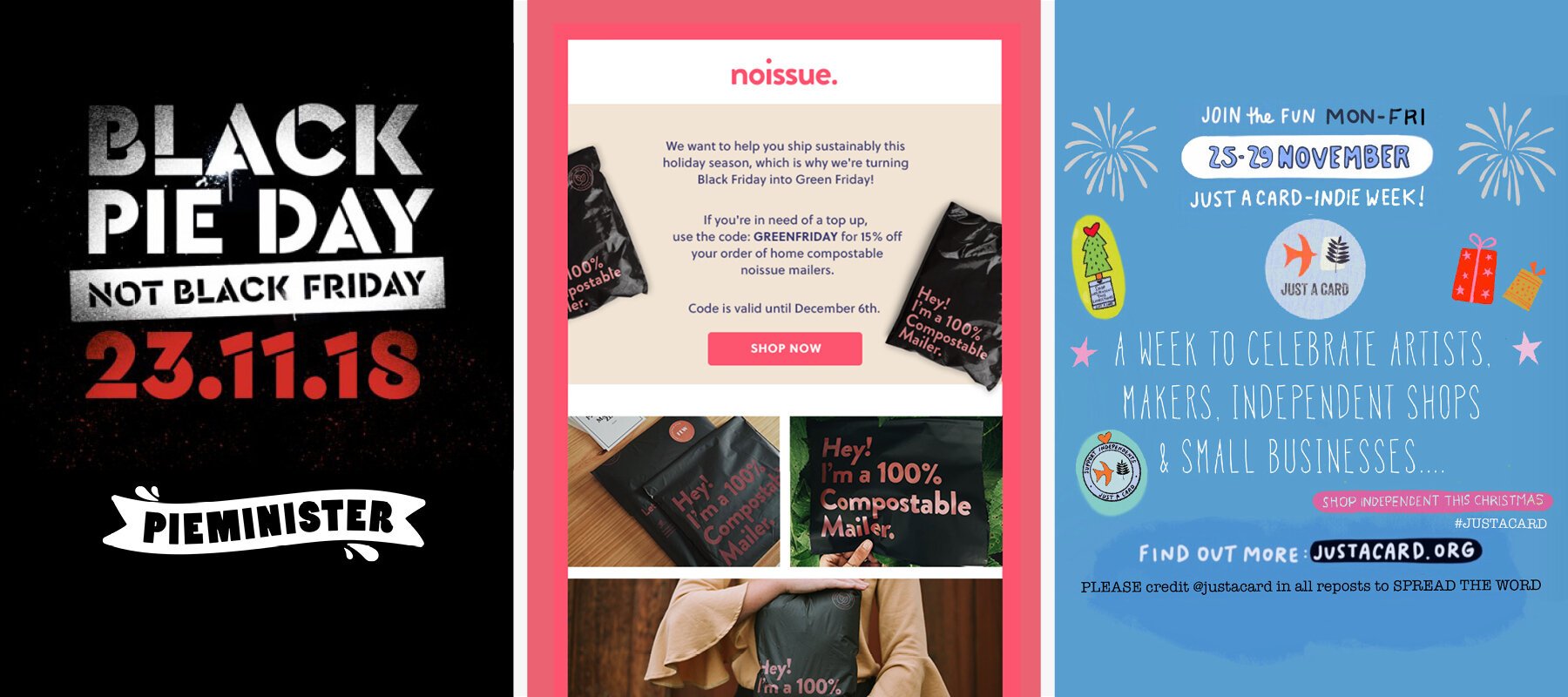That (Black) Friday Feeling
The background, the backlash & the indie impact
Love it or loathe it, the biggest shopping event of the year is here. Yes, ‘Black Friday’ itself is on the way, but many brands are already in full discounting mode... interesting when you think the phrase was first associated with a financial crisis and nothing to do with hitting the shops!
The background
Way back on Friday 24th September 1869, the US gold market crashed leaving Wall Street barons bankrupt and ‘Black Friday’ was born. Fast-forward to the 1950s and Philadelphia police officers used it to describe huge crowds of tourists and shoppers heading there the day after Thanksgiving, for the Army-Navy football game. Traffic jams, shoplifting opportunities and general chaos ensued and as the Police weren't allowed to take the day off, and worked long shifts to control the carnage, it became known as ‘Black Friday’ too. By the late 80s, it was widely linked to the post-Thanksgiving sales craze. So, bankruptcy and mayhem? Not particularly positive associations, it has to be said!
For better or worse though, Black Friday is now the USA's biggest event in the retail calendar, with shops slashing prices to boost profits and officially kick off the festive season. The UK hasn’t escaped bargain hysteria either. Over £7bn was spent online in the UK across Black Friday weekend last year and what started as a one-day event in the U.S. has turned into a global phenomenon.
So, with customers bombarded with bargains and the likes of Amazon and other online giants dominating the spending frenzy, how do brands stand out amongst all the madness and how do the smaller shops and independents respond? Should they take a ‘can’t beat them join them’ stance, rebel and not take part, or try something completely different? Well, it seems ‘opt out to stand out’ is a growing trend for many.
The backlash
The emergence of alternative Black Friday campaigns is something we’ve been keeping our eye on and there have definitely been some attention-grabbing approaches.
Cards Against Humanity, Mr Bingo and Patagonia have all had novel approaches to Black Friday in the past
The adult-themed card game, Cards Against Humanity, always go all out with their anti Black Friday campaigns. From raising prices by $5, to selling 30,000 boxes of actual bull s***, their stunts are as unconventional as the brand itself – which is probably why they’ve worked so well. Their now-annual tradition of poking fun at the concept of Black Friday, gives them an opportunity to stand out from the crowd in original ways, whilst people spend their money with them anyway.
And if it’s a different approach you’re after, check out experimental artist, Mr Bingo. He increases prices in his online shop by 25% over the period and his sales usually increase too. The artist himself reckons it’s because people love ‘taking part in the experiment’ and it just goes to show that doing things differently can definitely pay off.
Breaking the Black Friday mould comes in all shapes and sizes though. When outdoor clothing company Patagonia joined up with environmental initiative, One Percent for the Planet, in 2016, 100% of their Black Friday sales were donated to organisations dedicated to clean water, air and soil. This amounted to more than $10 million.
Led by the hashtag #loveourplanet, the campaign thrived precisely because it wasn’t what people were expecting. Customers could still enjoy the ‘buying thrill’, safe in the knowledge their spend would help to make the world a better place – and not only did Patagonia get great PR, their approach resonated deeply with their core target audience.
Greenpeace has also been taking a stance against the shopping event, setting up MAKE SMTHNG Week as a reaction to the mass consumerism of Black Friday. With more than 273 events in 38 countries, MAKE SMTHNG Week asks people to #BuyNothing and #MakeSmthng instead, by helping people improve their fixing and upcycling skills.
There are plenty more brands choosing to opt out of Black Friday to support charitable efforts too – the likes of FatFace, Pukka Herbs and Pret a Manger, to name just a few. Fatface, for example, donated £100,000 of profits made over the weekend to environmental and humanitarian charities.
The indie impact
Unable to compete with retail giants like Amazon and Apple, small independent brands are getting creative with their Black Friday backlash as well. Noissue, creators of eco-friendly packaging, are pledging to turn Black Friday green, by promoting their compostable mailers to help people ship sustainably this holiday season... and one of our favourite approaches to date came from Pieminister, with their aptly named ‘Black Pie Day’ project. Turning their pies black for a day (thanks to charcoal pastry), the UK pie shop donated 100% of profits from the black pie sales to the charity, Shelter.
Hats off to Pieminister, noissue and Just a Card for their creativity at this time of year
A nationwide not-for-profit campaign has also taken the UK by storm, encouraging people to support and buy from artists, makers, small businesses and independent shops, however little the purchase might be. ‘Just a Card’ champions ‘Indie Week’ which takes place from 25th -29th November this year and is designed to show the world some colour, instead of any hint of black! The celebration, in direct response to Black Friday, invites shoppers to unite and shop small, providing a platform for brands to showcase their brilliance. A five-day Instagram challenge gives indies a chance to make some noise and if social isn’t your thing, there’s ideas for shouting about your creations in real life too! And it’s seriously gathering momentum, with over 57,000 Instagram followers and many indies up and down the country proudly displaying their Just a Card sticker to show they’re part of it.
All in all, whether brands embrace Black Friday full on, campaign against it, or choose to simply ignore it, the key is consistency. Any action has to be in line with brand values, as brands seen to contradict themselves will undoubtedly feel the wrath of the consumer... no matter how marked down their microwaves are!



